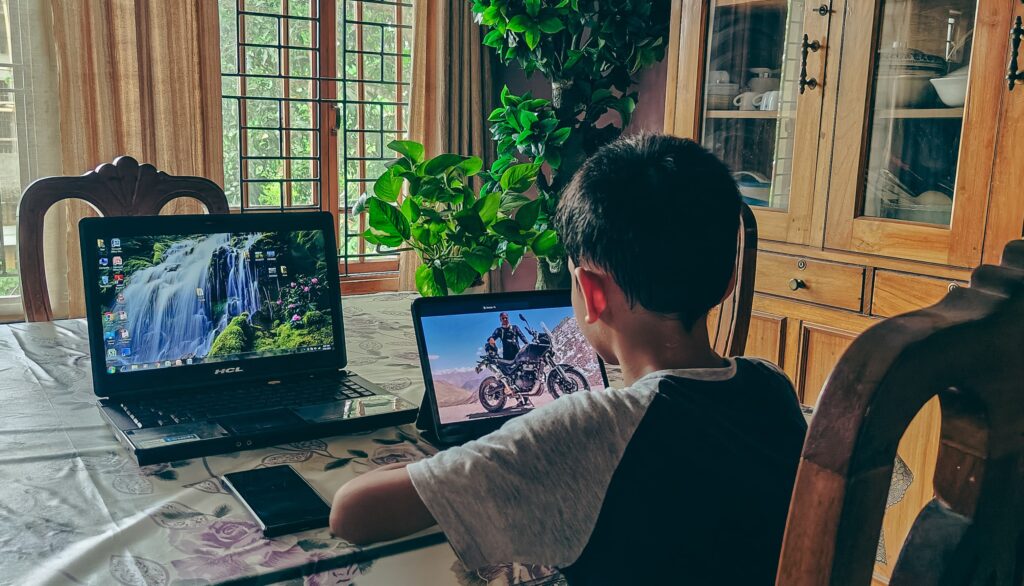Digital Dementia: A Major Concern
In today’s world, nobody can think of life without screens. With the outbreak of Covid-19, smartphones and laptops for attending online classes got the topmost priority among the children. Additionally, video games and short videos have already been a major source of attraction for them. With extensive use of screens, learning and entertainment become easier. However, too much screen time can affect the brain health of children. This condition is known as Digital Dementia.
But what exactly is Digital Dementia?
How can the parents protect the children from this digital menace?

What is Digital Dementia?
German neuroscientist Manfred Spitzer coined the term Digital Dementia first. He used this term to describe the cognitive decline due to excessive use of digital tools. Overuse of digital devices badly affects memory, focus and attention span. It especially affects the tender brains by creating emotional imbalance in them.
Why Children are at Risk?
Children learn the best when they are amidst nature, with peer and at play. They must be exposed to real life experiences. For this, they must have social interaction. Unfortunately, excessive screen time has brought the children away from those situations mentioned above. As a result, children’s brain activities slow down
How Are the Children Affected
- Poor attention span
- Poor memory and concentration
- Slow development of speech and language
- Poor academic performance
- Irritability and mood swings and changed behaviour
- Headaches
- Frequent eye-related disorder
- Poor sleep
Story of Rohan: A Student of Class IX
Rohan (name changed), a bright student of Class IX, lived with his parents in Jorhat, Assam. Both of his parents were in government jobs. They had busy schedules and therefore, they often returned home late. Rohan had a separate room for study. He gradually developed a habit of watching videos on mobile and playing games for long hours.
Teachers in school regarded him as a bright student. But slowly, he started losing focus. He forgot what he read, got poor marks, and often became annoyed. His parents were surprised to see this sudden change in him. They did not understand the reason behind this change—until they noticed his screen usage. Rohan was unknowingly suffering from Digital Dementia.
Rohan’s parents acted immediately. They decided to reduce the screen time of their child. They took leave from their office work in alternate manner to spend time with their child. They also resumed their old family habit i.e. reading in the evening. Rohan was encouraged to play outdoor with his friends. They often brought him out to enjoy being amidst nature. Thus, within a month, Rohan started becoming calmer, physically active and more alert.
Rohan’s story and the steps taken by his parents show that simple lifestyle changes can help to protect the children from this modern day menace.
Parents Need to be Alert If They See the Children:
- Using digital devices for a long time
- Losing focus while talking with others
- Becoming upset or angry when away from those digital gadgets
- Losing interest in academics and homework
- Becoming restless when screen time ends
- Frequently forgetting important things
- Gradually losing interest in social interactions and play
A 2023 study showed that excessive screen usage has harmful effects on:
- social and emotional growth, including a rise in the likelihood of obesity, sleep disorders, and mental health conditions including depression and anxiety.

WHO's screen time recommendations by age:
- Infant (less than 1 year of age): Screen time is not recommended.
- 1-2 years of age: No screen time for a 1-year-old. No more than an hour for 2-year-olds, with less time preferred.
- 3 to 4 years old: No more than one hour.
How to Prevent Digital Dementia in Children
1. Parents to be the role model:
- Children imitate parents. Parents should first manage their own screen time.
- Children will follow what their parents say and do. Therefore, they should be the role models for their children.
2. Set Healthy Screen Time for Children:
- Parents should set limits and necessary screen time for children once they have set their own.
- Allow only 1–2 hours of recreational screen time per day.
- To limit online activity of children, tools like parental control app may be used, when necessary.
3. Encourage reading beyond textbooks:
- Encourage children to read books, magazines etc. other than the course material.
- Subscribe to some newspapers or magazines as per their age.
4. Outdoor games are important:
- Let them go out for outdoor games like football, cricket, volleyball etc.
- It will help them to be physically active and energized.
- Playing in group and mixing with others will help children to become more sociable.
5. Help them to develop healthy social interaction:
- Take the children to family gatherings and outings.
- Encourage them to meet and interact with other children.
- Help them to be in group activities like reading club, hobby club etc.
- Help them find out their field of interest. It may be some creative writing, drawing, dramatics or any other hobbies
7. Create a digital-tool-free study room:
- Let the children study in a quiet room.
- There should be no distraction.
- Keep mobiles phones and other digital tools away during study hours.
8. Feed children Healthy Foods:
- Always provide children foods which are nutritious.
- Include fruits and vegetables in their diet.
- Provide and encourage them to eat those foods that support memory and brain function. Walnuts and almonds, flaxseeds or fish rich in omega-3 are beneficial for better brain health.
- Whole grains like oats or brown rice are good for adults and children alike.
- Modern day children are fond of junk food. Help the children to avoid or limit its consumption.
- Encourage them to eat home-cooked meals.
9. Spend Quality Time with Your Child:
- Always spend some quality time with children.
- Play with them, have fun with them, listen to them. Be close to them and understand their feelings.
10. Try a Weekly Digital Detox:
- Pick one day a week when the family avoids screens.
- Go for walks, play indoor games, or cook meals together.
Final Thoughts
Digital Dementia is a rapidly growing problem among children in today’s society. It is a present-day reality. Rohan’s story is just an example. Many children are victims of this modern problem. They are silently struggling with poor memory and concentration, lack of focus and emotional changes due to excess screen time. Parents and teachers must take a proactive role to help the children to cope with this problem immediately.
The best ways to be adopted by the parents and teachers are:
- Setting screen time-limits for children
- Helping children to develop healthy habits like playing outdoor games, reading books, magazines etc.
- Spending quality time with children
- Being their emotional support always
and being involved, we can protect young minds and help them thrive—both online and offline.
***
? Frequently Asked Questions (FAQs)
Q1. What is digital dementia in children?
It’s a condition where overuse of screens leads to memory problems, poor focus, and declining brain function.
Q2. Is digital dementia reversible?
Yes, it is reversible. Screen exposure should be reduced and more offline activities should be encouraged.
Q3. How much screen time is safe for kids?
For children aged 2–5, limit to 1 hour/day; for 6–12, no more than 2 hours (excluding schoolwork).


